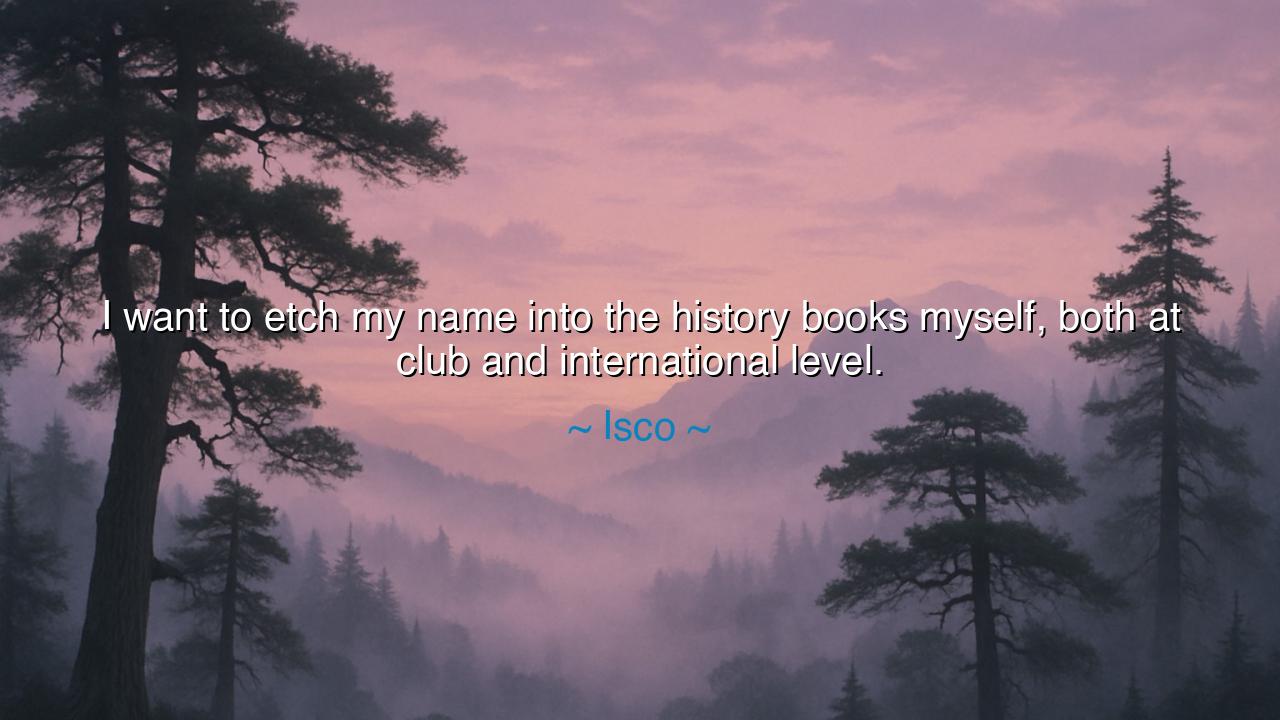
I want to etch my name into the history books myself, both at
I want to etch my name into the history books myself, both at club and international level.






“I want to etch my name into the history books myself, both at club and international level.” Thus spoke Isco, the Spanish footballer whose artistry on the pitch has long reflected the fire of ambition and the grace of genius. Beneath his words lies not arrogance, but the ancient yearning of the human spirit—to leave a mark, to be remembered, to carve one’s story into the great monument of time. His declaration is both personal and universal. For though the stage he speaks of is the field of sport, his desire echoes through all of human endeavor: the will to rise above obscurity, to make one’s life a testament to effort, purpose, and mastery.
In this quote, Isco gives voice to the eternal truth that greatness is not granted—it is forged. To “etch” one’s name is not to write it softly upon the sand, but to cut it deep into stone, where neither wind nor years can erase it. This is the mark of those who do not seek comfort, but challenge; who do not wait for destiny to bless them, but shape destiny with their own hands. His words remind us that history is not written by time itself, but by those who dare to stand within it—unafraid to fail, unwilling to fade.
The origin of such ambition lies in the very heart of sport and struggle. Isco, rising through the fierce crucible of Spanish football, carried within him both the burden and the blessing of legacy. He came from a nation of giants—Iniesta, Xavi, Ramos, and others who had already written golden chapters in the book of world football. Yet he did not wish merely to dwell in their shadows; he wished to join them, to write his own verse upon that immortal page. This is the spirit of all who aspire—not to imitate, but to contribute; not to borrow glory, but to create it anew.
Such hunger has always been the companion of greatness. Consider the tale of Alexander the Great, who, upon reaching the edge of the known world, wept because no more lands remained to conquer. His was not a sorrow of greed, but of boundless ambition—the same restless flame that burns in every heart that seeks to transcend mortality. Like Isco, Alexander longed not merely to live, but to live memorably. Both understood that life’s worth is not measured in years, but in deeds—and that every action well taken, every goal pursued with passion, becomes an inscription upon eternity.
But there is also humility in Isco’s statement, though it wears the armor of confidence. To wish to “etch” one’s name is to acknowledge that such engraving demands labor, perseverance, and sacrifice. History does not yield easily. It requires the artist to bleed for the beauty he creates, the athlete to endure for the triumph he desires. There are no shortcuts to immortality; each stroke of the chisel is a struggle against doubt, fatigue, and time itself. In this, Isco reminds us that ambition alone is not enough—only the discipline to sustain it can transform desire into destiny.
And yet, the lesson reaches beyond football, beyond fame. Every soul, in its own way, has a history to etch. A mother’s care, a teacher’s wisdom, a craftsman’s creation—all leave marks upon the world, unseen perhaps by crowds, but felt forever in the lives they touch. The call to greatness is not limited to stadiums or thrones; it is whispered to every heart that longs to matter. To live meaningfully is to inscribe one’s truth, however small, into the vast scroll of existence.
So, let us take Isco’s words as both challenge and blessing. Do not wait for others to write your story—write it yourself. Let your work, your passion, and your integrity be the tools with which you carve your name. Whether upon the field, in the studio, or within the quiet corners of everyday life, strive to live as though history itself watches and waits for your contribution. For every person who dares to leave a mark, however humble, joins the eternal company of those who refused to pass through the world unnoticed.
In the end, as Isco teaches, to etch one’s name into history is not about glory—it is about remembrance. It is to ensure that when time has carried away all else, the echo of one’s purpose still resounds. The ancients called this immortality, not of the body, but of the spirit. And that immortality belongs not only to kings or champions, but to all who live with courage, who act with intention, and who leave behind a trace of light upon the endless canvas of time.






AAdministratorAdministrator
Welcome, honored guests. Please leave a comment, we will respond soon